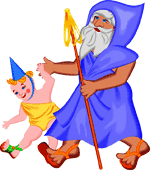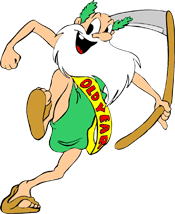We all know that a new year starts with the first day of January. It is a public holiday that we all enjoy with feasts and festivity. But when did New Year celebrations begin?
 New Year celebrations are believed to have first originated in ancient
Babylon about 4000 years ago. Around 2000 BC, the Babylonians started
the tradition of beginning their New Year with the first New Moon after
the Vernal Equinox (first day of spring) in mid-March. Today, we observe
our New Year for only a day, but the Babylonian new year celebrations
lasted for eleven days. And how grand their celebrations were! Our
grandest New Year festivities are nothing compared to how they observed
their New Year.
New Year celebrations are believed to have first originated in ancient
Babylon about 4000 years ago. Around 2000 BC, the Babylonians started
the tradition of beginning their New Year with the first New Moon after
the Vernal Equinox (first day of spring) in mid-March. Today, we observe
our New Year for only a day, but the Babylonian new year celebrations
lasted for eleven days. And how grand their celebrations were! Our
grandest New Year festivities are nothing compared to how they observed
their New Year.
It was the Romans who, in 153 B.C., began to observe January 1 as the beginning of the new year. Before this, the Romans observed their new year in late March (probably March 15 or March 25, the date of the Vernal Equinox). But with the change of Roman emperors, the Roman calendar was changed many times because every emperor wanted to set the calendar in his own way. Then in 46 BC, Julius Caesar established the Julian Calendar which again established January 1 as the Roman New Year. From this time, the Romans started to celebrate their New Year's Day on January 1.
But in Europe of the Middle Ages, the early Catholic Church disapproved the New Year festivities saying these were against the Christian tradition. In 567 AD, the Council of Tours abolished January 1 as the beginning of the year. At various times and in various places throughout medieval Christian Europe, the new year began to be celebrated on various dates like Dec. 25 (the birth of Jesus); March 1; March 25 (the Feast of the Annunciation) or during Easter.
 Then in 1582, Pope Gregory XIII established the Gregorian calendar to
correct an error in the Julian calendar. This reform again restored the
practice of observing New Year's Day on January 1. Although most
Catholic countries adopted the Gregorian calendar almost immediately, it
was only gradually adopted among Protestant countries. You will probably
be surprised to know that January 1 has been celebrated as a holiday by
the Western nations for only about the past 400 years. Germany took up
the new tradition in 1700, Britain in 1752 and Sweden in 1753. The
Oriental countries, through the influence of religious groups such as
the Hindus, Taoists, Buddhists and Muslims looked upon the new Calendar
as the Christian Calendar, but also adopted it as their official one.
Japan embraced it in 1873 and China in 1912. The orthodox eastern
nations adopted it even later, in 1924 and 1927, Russia took it twice -
first in 1918 and again in 1924, after trying out its own calendars.
Then in 1582, Pope Gregory XIII established the Gregorian calendar to
correct an error in the Julian calendar. This reform again restored the
practice of observing New Year's Day on January 1. Although most
Catholic countries adopted the Gregorian calendar almost immediately, it
was only gradually adopted among Protestant countries. You will probably
be surprised to know that January 1 has been celebrated as a holiday by
the Western nations for only about the past 400 years. Germany took up
the new tradition in 1700, Britain in 1752 and Sweden in 1753. The
Oriental countries, through the influence of religious groups such as
the Hindus, Taoists, Buddhists and Muslims looked upon the new Calendar
as the Christian Calendar, but also adopted it as their official one.
Japan embraced it in 1873 and China in 1912. The orthodox eastern
nations adopted it even later, in 1924 and 1927, Russia took it twice -
first in 1918 and again in 1924, after trying out its own calendars.
Today, with feasts, parades, resolutions, fireworks, partying and get-togethers, the New Year is celebrated all over the world on January 1.
Try out the other sections